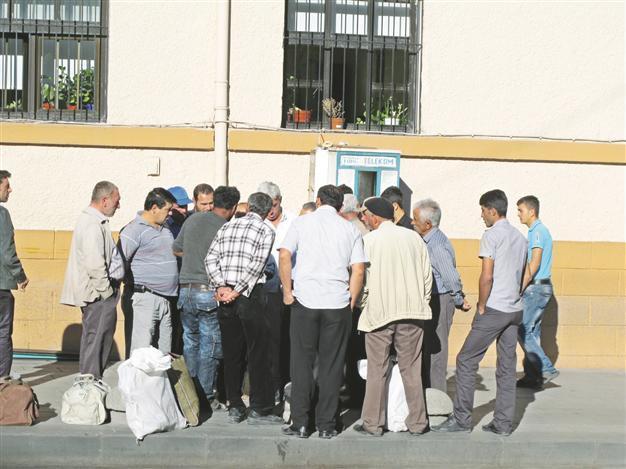Daily workers in Ankara show economic situation
Wilco van Herpen ANKARA - Hürriyet Daily News

In the Amele Pazarı, people with big drills, saws, brushes or other equipment are lined up alongside the road for the same reason, finding work. The average age of the people is 50 but there are a small group of youngsters under the age of 25.
Reading newspapers and watching television, I believe the economy of Turkey is not bad. At least, that is the information I get from them and from people I speak with on the street. At the same time there are a lot of people who are complaining about the economy. “We don’t have work, it is difficult to find a job,” are frequently heard complaints. I am not an economist nor am I trained enough to really hear what all the politicians are telling me. As you know, you always have to read in between the lines and listen to the unstressed little words politicians say.At the moment I am doing a television project about the European Union and Turkey. What has changed in the last 10 years, what hasn’t? As far as I know, a lot of things have changed in Turkey, especially economically and for children, women, animals, agriculture etc. But is it enough or are there things that still need a lot of work? What I have learned so far is that indeed the road to fulfilling the European criteria is a long one, but let’s stay positive and believe that those things also will be changed.
Amele Pazarı
One day, I had to go to Ankara for the project. The focus was on workers, unemployment, social security, safety rules etc. The first thing that came to my mind was South Africa. I stayed as a photographer between 1992 and 1993 in Cape Town and every morning I saw hundreds of people gathered along the side of the road. Wondering why they were there, I spoke with a friend who told me that those people were waiting for employers who wanted to give them a job for a day, a week, or, if they were lucky, an even longer period of time. Once I moved from Cihangir to Zekeriyaköy, I saw the same thing. People were waiting just outside Zekeriyaköy on the side of the road for work. As many as 100 people (just in Zekeriyaköy, Istanbul) could be standing there.
That morning, when I arrived in Ankara, Ulus and I went to the Amele Pazarı (Amele market). Hundreds of people were waiting; people with big drills, saws, brushes or other equipment, all of them lined up alongside the road. Amele Pazarı is a depressing place with some sad concrete “art” and buildings in the making but in the beautiful, warm morning sunlight, things looked much better than they actually were. The waiting people were divided into small groups, which I quickly learned represented different provinces or cities of Turkey. I saw people from Trabzon, Samsun, Ankara or Konya, all they had in common was that they were waiting for work, work that they desperately needed. The average age of the people was 50 but I also saw a small group of youngsters under the age of 25.
They were all there for the same reason: finding work. Although the economic situation in Turkey is not bad at the moment (unlike the politicians make you believe), I found hundreds of men who wanted to work but could not find a job. Waiting here in the hot summer mornings or cold winter mornings, they were trying their luck. Maybe someone would come today and offer them a job for a week or, if they were lucky, even a month. The problem with this system is that they are never sure when they will find a job to do. Sometimes they went to the Amele Pazarı for weeks in a row without finding a job. And if they were lucky enough to find a job, then the question is if it would be for just a single day or longer or, even more importantly, would it be an insured job. Most of the jobs offered there are without insurance. Their situation is not easy and the biggest complaint of theirs was waiting at the side of the road for work, as if they were prostitutes. If there was a system similar to Europe, where there are employment agencies, it would make their lives easier. Those agencies arrange the payment, the insurance and also very importantly, you do not have to wait at the side of the street for work.
Waiting for job
Just 100 meters away from the place the men were waiting I found a couple of cafés. People who did not find work by 10 in the morning generally go there to wait in case a job will suddenly be offered. It is a depressing concrete passage where the people gather and sip their tea.
One laborer said, “I agree that for a lot of people the life and job standards became better, but at the same time it looks as if the people forgot about us. We cannot join a union, we do not have any insurance and if someone offers us a job the negotiation of the payment is so severe, we hardly earn any money. But what can we do? If we sit and wait at home nobody will find us, and we won’t have any food or new clothes for me or my children so I must come here every day. Last month I was lucky, I found a job for a couple of weeks in a row. But this week has been bad; nobody offered my friends or me any jobs. Inşallah everything will become better.”
While walking away, I thought about how lucky I was and how difficult and remorseless life can be for people.
















